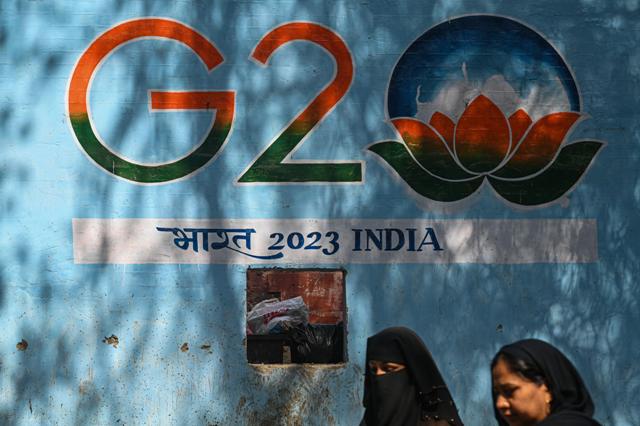 February 2023: A woman walks past a wall in New Delhi. [photo: Kabir Jhangiani/ZUMA Press Wire via Alamy]
February 2023: A woman walks past a wall in New Delhi. [photo: Kabir Jhangiani/ZUMA Press Wire via Alamy]
[This is an excerpt from an article in The Round Table: The Commonwealth Journal of International Affairs.]
Another major challenge is the global energy crisis. The Russia-Ukraine conflict has caused huge disruptions in the energy supply chains. This is because the West has imposed sanctions on Russia and blocked its supply routes, and Russia has in turn stopped sending oil and gas to Europe. The recent agreement between the UN and Ukraine to allow the shipping of food grains is perhaps a good template for how to reach a similar agreement to make it easier for Russia to send gas to Europe. The G20 seems well-suited to achieve such an agreement.
Yet another challenge is climate change. It is hard to convince G-20 countries on a common climate agenda for a greener future. There are a lot of contradictions between the Global North and South. India needs to keep pointing out these contradictions while simultaneously trying to find ways to help developing countries pay for their transitional needs as they move to more climate-friendly policies.
That said, India also has a chance to show its leadership on the world stage with a potential to change the way the G-20 works. This will need showcasing and vigorous promotion of the Indian presidency’s agenda, which focuses on four key areas: health and well-being; skills and innovation; sustainable development; and inclusiveness and fairness.
India’s domestic and foreign policy responses to COVID-19
India’s multilateral foreign policy strategy: phases of its evolution
India in a changing global world: understanding India’s changing statecraft and Delhi’s international relations
On climate commitments and climate actions, India can show the path to the world as it has achieved the 40% non-fossil energy source capacity target nine years well ahead of the deadline that had been set. On health, India has given many innovations to the world during the time of Covid-19, from vaccine development to carrying out a successful vaccination programme on a massive scale, while also providing vaccines to other countries.
Developing countries are seeing India as their voice to create inclusive and fair relationships among the G-20 countries. The Indian presidency can give a healing touch to the world. It is true that the one year is not enough to give any country the power to change the world, but India can still make a dent, not least by taking a leaf out of its own successes at home. The digital revolution and the success of the ‘Make in India’ initiative, which have yielded the country huge dividends in recent years, can effectively demonstrate India’s prowess and capacity to the world.
Aditya Kumar Shukla is Associate Professor, Journalism and Mass Communication, Manipal University Jaipur, Rajasthan, India.



